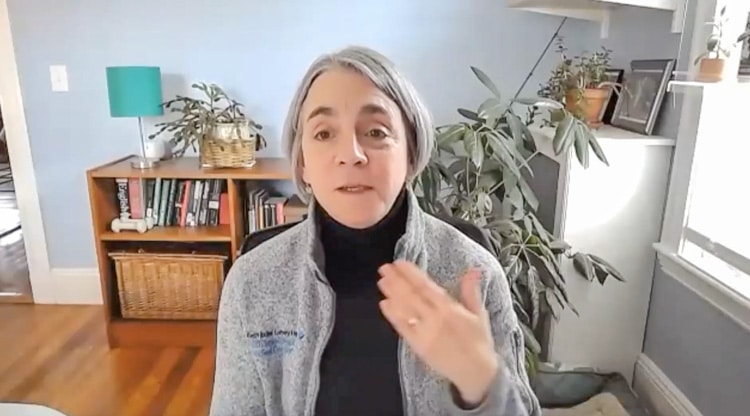
BOSTON, MA—In late January, OpenNotes Director, Catherine M. DesRoches, DrPH, presented on new applications of and opportunities for open notes at the Department of Medicine Grand Rounds at Beth Israel Deaconess Medical Center. In addition to directing OpenNotes, Dr. DesRoches is Associate Professor of Medicine at Harvard Medical School, and the Co-Director of the Faculty Scholars Program in the Division of General Medicine, BIDMC.
This presentation can be viewed in its entirety here. Highlights are outlined below.
How we got here: Dr. DesRoches grounded her presentation with historical context. After the 21st Century Cures Act passed in 2016, Congress directed the U.S. Department of Health & Human Services (HHS) to improve data interoperability, specifically stating that patients should have electronic access to their health information. In 2021, the Office of the National Coordinator for Health IT reinforced this idea through the Information Blocking Rule, which mandated that all electronic protected health information be made accessible to patients upon request… essentially making open notes the law of the land.
OpenResults: One of the most challenging impacts of the Information Blocking Rule focuses on patients’ immediate access to test results through online portals. A recent study by OpenNotes and collaborators highlighted the shift in patients now viewing their test results on portals before clinicians. Only 7% of patients surveyed in the four-site study said they were more worried after viewing a result before talking to a clinician. The data suggests that patients who receive “pre-counseling” about why a test is preformed may be less likely to report worry after viewing results.
OurNotes: OurNotes is the concept of engaging patients through co-generating clinical notes. The original OurNotes study, led by OpenNotes Co-Founders, has been successfully piloted at multiple healthcare centers. With OurNotes, patients are invited to complete a pre-visit questionnaire, with their responses incorporated into the clinical note at the clinician’s discretion. OpenNotes is building on this early pilot work with new innovations focused on safe diagnoses and care partners.
OurDX: Building on OurNotes, Dr. DesRoches introduced the pilot of OurDiagnosis (OurDX) led by OpenNotes Director of Patient Safety Sigall Bell, MD. The initiative, co-developed with patients and families, aims to address three key aspects: patient priorities, health updates, and ensuring accurate information. Results from the pilot indicated that patients, using a pre-visit questionnaire, provided actionable diagnostic information about things that happened outside of a visit that the clinician would not know. Patient contributions primarily focused on clinical symptoms, history, test-related issues, and questions about diagnosis. Dr. DesRoches discussed how co-generating notes can enhance patient safety, and how patients have been shown to provide actionable information that can contribute to the diagnostic process positively. Read more about this research here, here, here, here, and here.
OurNotes for Care Partners: Based on the original OurNotes pilot, Dr. DesRoches introduced “OurNotes for Care Partners,” a pre-visit questionnaire specifically designed for individuals with caregiving responsibilities. OurNotes for Care Partners has been implemented at five primary care practices, resulting in a high response rate (45%) and positive feedback from clinicians. Caregivers are directed to a, where they can assess the intensity of their caregiving responsibilities and find resources specific to their needs and the community in which they live. Preliminary analysis of patient reports indicates that patients use the OurNotes for Caregivers to convey important life changes, even if these are not the primary focus of their upcoming visit.
Looking Ahead: OpenNotes has evolved since the first published study over a decade ago. Dr. DesRoches says the focus now is on enhancing the patient experience and ensuring that technology, like predictive and generative AI, is leveraged to address challenges related to diverse patient populations. Importantly, she asks, “How might we share documentation in a way that ensures success for patients, families, and clinicians?”



